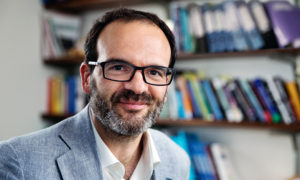Despite 15 years of investment in the Afghan health care sector by the international community, vulnerable groups — including persons with disabilities — cite a growing rate of insufficient access to quality health care, finds a new Washington University in St. Louis study published in the journal Lancet Global Health.

“We find that access to quality health care has decreased significantly between 2004 and 2014,” said Jean-Francois Trani, associate professor at the Brown School and lead author of the study, “Assessment of Progress Towards Universal Health Coverage for People with Disabilities in Afghanistan: A Multilevel Analysis of Repeated Cross-sectional Surveys.”
The study used data from two representative household surveys, one done in 2005 and one in 2013, in 13 provinces of Afghanistan. Surveys included questions about activity limitations and functioning difficulties, socioeconomic factors, perceived availability of health care and experience with coverage of health-care needs.
Between 2005 and 2013, Trani wrote in the study, there was a striking, 25 percent increase in the proportion of survey respondents for whom health care was not available (31 percent to 56 percent) and whose experience with coverage of health-care needs was negative (23 percent to 55 percent).
Respondents with disabilities in the 2013 survey were more than three times less likely to report availability of health care than those in the 2005 survey.
Even after taking village remoteness into account, the time for people with disabilities to reach a health-care facility was longer and connectivity by paved roads was worse in 2013 than in 2005.
To reverse this trend, a multilevel intervention is necessary to meet the United Nations’ Sustainable Development Goal 3 of universal health-care coverage, Trani said.
“First, we must promote a community-based health-care and education system to promote hygiene and prevention of diseases, treat common childhood disorders, communicable diseases, such as malaria, and provide basic reproductive health advice, which will contribute to the prevention of many disabilities,” he said.
“We need to train community health workers to assess disabilities, address stigma associated with disability and increase referral and providing of free transportation and free access to hospitals,” said Trani, a member of the university’s Global Research on Inclusion and Disability team.
“Yet, such a program will only be effective if a political solution to the ongoing conflict is successfully sought,” he said.
Co-authors on the paper are Brown School graduate students Ellis Ballard and Praveen Kumar, and Tarani Chandola of the School of Social Sciences at the University of Manchester.
The study was funded by the Swedish International Development Agency.